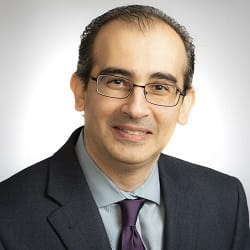
12/11/2020

The study, conceived by
Amr Sawalha, M.D., professor of pediatrics and medicine at Pitt, and chief, Division of Pediatric Rheumatology,
UPMC Children’s Hospital of Pittsburgh, accumulated samples from 1,226 individuals with Takayasu arteritis across five different populations around the globe, making it the largest collection of these samples in the world.
In Takayasu arteritis, inflammation damages the aorta and other large vessels, which can lead to rupture of major blood vessels or decreased blood supply to the limbs, brain and other vital organs and puts patients at risk of a heart attack, stroke or major blood loss and organ damage.
“Many of us who treat patients with Takayasu arteritis are frustrated because we don’t really know how the disease works,” said Sawalha. “We don’t have good tools to predict a disease flare-up. Some patients have very active disease without clear symptoms or an increase in inflammatory markers.”
By performing a genome-wide association study in healthy people and Takayasu arteritis patients, the researchers identified variations in several regions of the genome suggestive of the role of certain immune cells in this disease. They also identified novel molecules and pathways that can be targeted for therapy.
The team went on to compare the genetics of Takayasu arteritis with genetic predisposition to hundreds of other traits, assessing shared genetics between Takayasu arteritis and other immune-mediated diseases.
“We found that, genetically speaking, Takayasu arteritis was closest to Crohn’s disease,” said Sawalha. “This suggests that we can try developing treatments based on what we know works for inflammatory bowel disease, which is a much more common condition.”
Until this report, knowledge about the genetic predisposition to Takayasu arteritis was extremely limited, due to difficulty collecting a large enough number of samples to represent the genetic architecture of ancestrally diverse populations.
This study was made possible only because of international collaborations, said Sawalha. His group gathered samples and data from patients in Turkey, Canada, China, Italy, the United Kingdom and across the U.S., and included patients from populations under-represented in genetic studies.
In the future, scientists hope to use their data to find genetic determinants of how the disease manifests itself—which individuals are more likely to develop severe disease, which arteries might be affected and which patients are more likely to carry the disease silently without presenting easy-to-identify molecular markers.
“This study opens a lot of possibilities,” said Sawalha. “Expanded knowledge of the genetic component of Takayasu arteritis will help us develop more effective therapies moving forward.”
Other authors on the manuscript include Lourdes Ortiz-Fernandez, Ph.D., of Pitt; Haner Direskeneli, M.D., of
Marmara University in Turkey; Peter Merkel, M.D., M.P.H., of the
University of Pennsylvania; Justin Mason, M.D., Ph.D., of
Imperial College London; Lindi Jiang, M.D., Ph.D., of
Fudan University in China; and Enrico Tombetti, M.D., of
University of Milan, among 71 total authors.
CREDIT: UPMC
CAPTION: Amr Sawalha, M.D., professor of pediatrics and medicine at Pitt, and chief, Division of Pediatric Rheumatology, UPMC Children’s Hospital of Pittsburgh.

 The study, conceived by Amr Sawalha, M.D., professor of pediatrics and medicine at Pitt, and chief, Division of Pediatric Rheumatology, UPMC Children’s Hospital of Pittsburgh, accumulated samples from 1,226 individuals with Takayasu arteritis across five different populations around the globe, making it the largest collection of these samples in the world.
The study, conceived by Amr Sawalha, M.D., professor of pediatrics and medicine at Pitt, and chief, Division of Pediatric Rheumatology, UPMC Children’s Hospital of Pittsburgh, accumulated samples from 1,226 individuals with Takayasu arteritis across five different populations around the globe, making it the largest collection of these samples in the world. 















